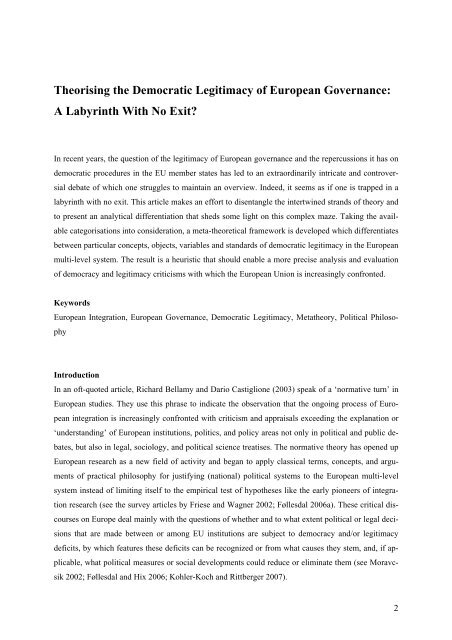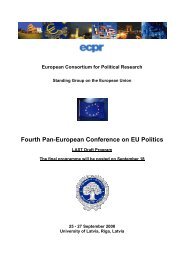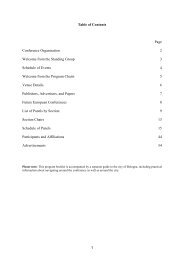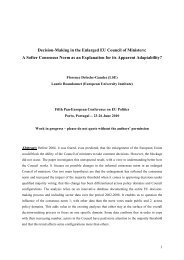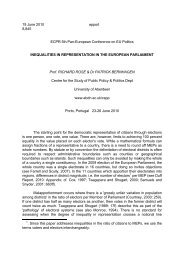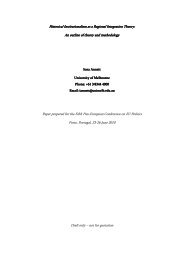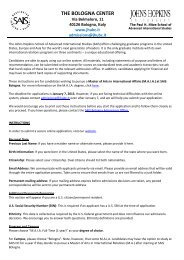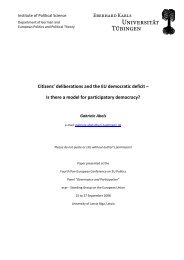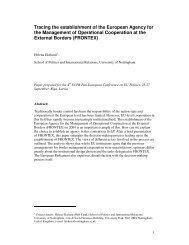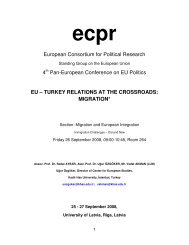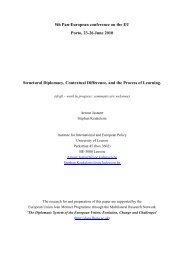Theorising the Democratic Legitimacy of European Governance
Theorising the Democratic Legitimacy of European Governance
Theorising the Democratic Legitimacy of European Governance
You also want an ePaper? Increase the reach of your titles
YUMPU automatically turns print PDFs into web optimized ePapers that Google loves.
<strong>Theorising</strong> <strong>the</strong> <strong>Democratic</strong> <strong>Legitimacy</strong> <strong>of</strong> <strong>European</strong> <strong>Governance</strong>:<br />
A Labyrinth With No Exit?<br />
In recent years, <strong>the</strong> question <strong>of</strong> <strong>the</strong> legitimacy <strong>of</strong> <strong>European</strong> governance and <strong>the</strong> repercussions it has on<br />
democratic procedures in <strong>the</strong> EU member states has led to an extraordinarily intricate and controver-<br />
sial debate <strong>of</strong> which one struggles to maintain an overview. Indeed, it seems as if one is trapped in a<br />
labyrinth with no exit. This article makes an effort to disentangle <strong>the</strong> intertwined strands <strong>of</strong> <strong>the</strong>ory and<br />
to present an analytical differentiation that sheds some light on this complex maze. Taking <strong>the</strong> available<br />
categorisations into consideration, a meta-<strong>the</strong>oretical framework is developed which differentiates<br />
between particular concepts, objects, variables and standards <strong>of</strong> democratic legitimacy in <strong>the</strong> <strong>European</strong><br />
multi-level system. The result is a heuristic that should enable a more precise analysis and evaluation<br />
<strong>of</strong> democracy and legitimacy criticisms with which <strong>the</strong> <strong>European</strong> Union is increasingly confronted.<br />
Keywords<br />
<strong>European</strong> Integration, <strong>European</strong> <strong>Governance</strong>, <strong>Democratic</strong> <strong>Legitimacy</strong>, Meta<strong>the</strong>ory, Political Philosophy<br />
Introduction<br />
In an <strong>of</strong>t-quoted article, Richard Bellamy and Dario Castiglione (2003) speak <strong>of</strong> a ‘normative turn’ in<br />
<strong>European</strong> studies. They use this phrase to indicate <strong>the</strong> observation that <strong>the</strong> ongoing process <strong>of</strong> <strong>European</strong><br />
integration is increasingly confronted with criticism and appraisals exceeding <strong>the</strong> explanation or<br />
‘understanding’ <strong>of</strong> <strong>European</strong> institutions, politics, and policy areas not only in political and public debates,<br />
but also in legal, sociology, and political science treatises. The normative <strong>the</strong>ory has opened up<br />
<strong>European</strong> research as a new field <strong>of</strong> activity and began to apply classical terms, concepts, and arguments<br />
<strong>of</strong> practical philosophy for justifying (national) political systems to <strong>the</strong> <strong>European</strong> multi-level<br />
system instead <strong>of</strong> limiting itself to <strong>the</strong> empirical test <strong>of</strong> hypo<strong>the</strong>ses like <strong>the</strong> early pioneers <strong>of</strong> integration<br />
research (see <strong>the</strong> survey articles by Friese and Wagner 2002; Føllesdal 2006a). These critical discourses<br />
on Europe deal mainly with <strong>the</strong> questions <strong>of</strong> whe<strong>the</strong>r and to what extent political or legal decisions<br />
that are made between or among EU institutions are subject to democracy and/or legitimacy<br />
deficits, by which features <strong>the</strong>se deficits can be recognized or from what causes <strong>the</strong>y stem, and, if applicable,<br />
what political measures or social developments could reduce or eliminate <strong>the</strong>m (see Moravcsik<br />
2002; Føllesdal and Hix 2006; Kohler-Koch and Rittberger 2007).<br />
2


